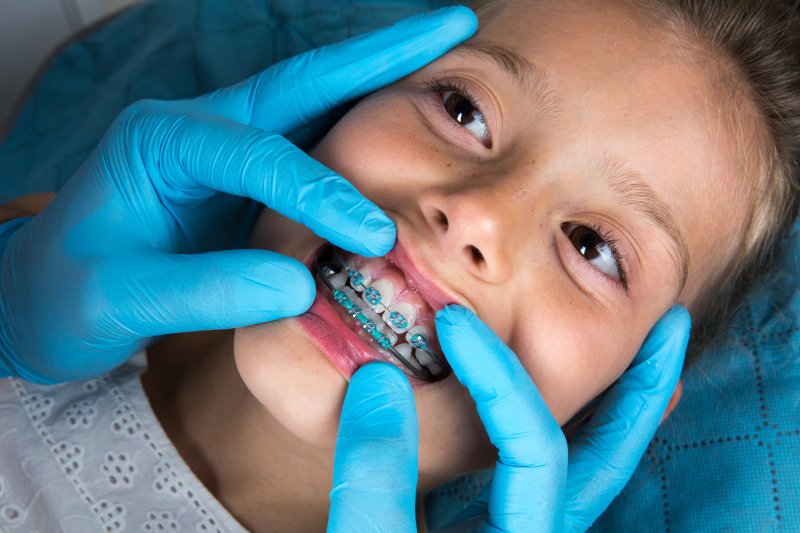Last Updated on January 15, 2025
Yes, insurance often covers braces for children. In fact, many insurance plans include orthodontic coverage for children’s braces.
Braces can be a costly expense, but with insurance, parents can have peace of mind knowing that a portion or all of the expenses may be covered. Insurance coverage typically depends on the specific policy and insurance provider, so it is essential to review the policy details to understand the extent of coverage for braces.
By understanding the insurance coverage, parents can better plan for their child’s orthodontic treatment and ensure the financial burden is manageable.
Insurance Coverage For Braces
Braces can significantly improve the oral health and self-confidence of a child. However, the cost of braces can be a concern for many parents. This is where insurance coverage comes into play. Understanding how insurance coverage for braces works can help parents navigate the financial aspect of this orthodontic treatment.
Importance Of Insurance Coverage For Braces
Insurance coverage for braces is essential for families seeking orthodontic treatment for their children. Braces are not just a cosmetic solution; they can provide functional and long-lasting benefits for a child’s oral health. It is crucial to ensure that insurance policies cover this important dental procedure in order to make it accessible to all.
With insurance coverage, families have peace of mind knowing that the financial burden associated with braces treatment is significantly reduced. This allows parents to invest in their child’s oral health without worrying about the high out-of-pocket costs. Insurance coverage for braces can make a world of difference for families who require this orthodontic treatment.
Factors Influencing Insurance Coverage For Braces
The extent of insurance coverage for braces varies depending on several factors. It is important to understand these factors to assess the overall coverage offered by insurance policies. Here are some key considerations:
- Insurance Plan: Different insurance plans may have varying degrees of coverage for braces. Some plans may provide comprehensive coverage, while others may only cover a portion of the costs. It is essential to review the policy details to understand the extent of coverage offered.
- Age Limit: Certain insurance plans may have an age limit for orthodontic coverage. They may only cover braces for children below a certain age or within a specific age range. It is important to check the age limitations set by the insurance provider to determine eligibility for coverage.
- Orthodontic Evaluation: Insurance companies often require an orthodontic evaluation to determine the necessity of braces and the level of coverage. This evaluation helps insurance providers assess the medical need for braces and make coverage decisions accordingly.
- Preauthorization: Some insurance plans may require preauthorization before initiating orthodontic treatment. This means that parents need to obtain approval from the insurance company before proceeding with braces treatment. Failure to obtain preauthorization can result in reduced coverage or even denial of claims.
- Waiting Period: Certain insurance plans may impose a waiting period before providing coverage for braces. This waiting period can range from a few months to a year. It is important to be aware of any waiting periods associated with the insurance policy to plan for braces treatment accordingly.
By considering these factors, parents can better understand the insurance coverage available for their child’s braces. It is advisable to consult with the insurance provider and orthodontist to gain clarity on these considerations and make informed decisions regarding the financial aspect of braces treatment.
Types Of Insurance Coverage For Braces
When it comes to getting braces for your child, many parents wonder if insurance will cover the cost. Insurance coverage for braces can vary depending on the type of insurance plan you have. In this article, we will explore the different types of insurance coverage available for braces and what you need to know about them.
Dental Insurance
Dental insurance plans often include coverage for orthodontic treatment, including braces. However, it’s important to note that not all dental insurance plans offer this coverage. If your plan does provide coverage for braces, it may have limitations and exclusions that you need to be aware of.
Coverage options for braces
Under dental insurance plans, there are typically two types of coverage options for braces:
- Full coverage: Some dental insurance plans offer full coverage for orthodontic treatment, which means they will cover a significant portion of the cost of braces. This can greatly reduce the financial burden on parents.
- Partial coverage: Other dental insurance plans may offer only partial coverage for braces. This means that you will still need to pay a portion of the cost out of pocket. The amount covered by the insurance company will vary depending on the plan.
Limitations and exclusions
It’s important to review the limitations and exclusions of your dental insurance plan when it comes to braces. These limitations may include age restrictions, waiting periods, and specific criteria that need to be met before coverage kicks in. For example, some plans may require a child to reach a certain age or have a specific degree of misalignment before coverage is provided.
Orthodontic Insurance
In addition to dental insurance, there are also specialized orthodontic insurance plans that focus specifically on orthodontic treatment, including braces. These plans may provide more comprehensive coverage for orthodontic treatment compared to regular dental insurance plans.
Advantages of orthodontic insurance
Orthodontic insurance plans have several advantages when it comes to covering the cost of braces:
- Higher coverage limits: Orthodontic insurance plans generally have higher coverage limits compared to dental insurance plans. This means they are more likely to cover a larger portion of the braces cost.
- No age restrictions: Orthodontic insurance plans typically do not have age restrictions, meaning they can provide coverage for both children and adults who require orthodontic treatment.
Coverage details for braces
The coverage details for braces under orthodontic insurance plans can vary, but they generally include:
| Coverage details | Explanation |
|---|---|
| Diagnostic expenses | Coverage for X-rays, examinations, and other diagnostic procedures to determine the need for braces. |
| Brace installation | Cost coverage for the installation of braces, including the materials and labor involved. |
| Adjustments and maintenance | Coverage for regular adjustments and maintenance visits during the duration of the orthodontic treatment. |
| Post-treatment expenses | Some orthodontic insurance plans also provide coverage for post-treatment procedures, such as retainers, to maintain the results after the braces are removed. |
There are various types of insurance coverage available for braces, including dental insurance and specialized orthodontic insurance plans. It’s important to carefully review the coverage options, limitations, and exclusions of your insurance plan to understand what is covered and what you may need to pay out of pocket.
Navigating Insurance Policies For Braces Coverage
When it comes to orthodontic treatment for children, the cost of braces can be substantial. Many parents wonder if insurance will cover this expense. In this article, we will guide you through the process of navigating insurance policies for braces coverage. Understanding the eligibility criteria, documentation requirements, and pre-authorization steps can help you make informed decisions and avoid any potential surprises. Let’s dive in!
Eligibility Criteria For Braces Coverage
Before diving into the details, it’s essential to check if your insurance policy covers orthodontic treatment, including braces, for children. Insurance companies often have specific criteria that determine eligibility for coverage. These criteria vary from one policy to another, so it’s crucial to review your insurance plan or contact your insurance provider directly to understand the specific requirements.
Age Restrictions
Most insurance policies have age restrictions when it comes to braces coverage. Typically, orthodontic treatment is covered for children under the age of 18. However, age limits can vary depending on your insurance provider. It’s essential to clarify the age restrictions imposed by your policy to ensure timely coverage for your child’s orthodontic needs.
Orthodontic Evaluation Requirements
Insurance companies usually require an orthodontic evaluation before approving coverage for braces. This evaluation is typically conducted by a qualified orthodontist who will assess your child’s dental condition and determine if braces are medically necessary. The evaluation report plays a crucial role in the insurance claims process, and it’s important to ensure that it meets all the necessary requirements set by your insurance provider.
The Claims Process
Submitting a claim for braces coverage involves following the insurance company’s claims process. It’s vital to understand the specific steps and documentation required to file a claim. This may include completing claim forms, attaching relevant invoices, and providing supporting documents, such as the orthodontic evaluation report. Understanding the claims process can help streamline the reimbursement process and ensure a smoother experience.
Documentation And Requirements
When filing a claim for braces coverage, proper documentation is crucial. Make sure to gather all the necessary documents, such as X-rays, photographs, treatment plans, and any other supporting materials required by your insurance provider. Accurate and complete documentation plays a significant role in securing coverage for your child’s orthodontic treatment.
Pre-authorization Steps
Pre-authorization is an essential step in the braces coverage process. It involves obtaining approval from the insurance company before starting the orthodontic treatment. This step helps determine if the treatment is covered, the percentage of coverage, and any out-of-pocket expenses you may be responsible for. Pre-authorization provides peace of mind and allows you to plan accordingly.
Obtaining Pre-approval For Braces Coverage
To obtain pre-approval for braces coverage, you will need to submit the necessary documentation to your insurance provider. This may include the orthodontic evaluation report, treatment plans, X-rays, and any other supporting materials. Once the insurance company reviews the submitted documents, they will provide you with the necessary approval or further instructions.
It’s important to remember that pre-approval does not guarantee coverage. However, it provides valuable insight into your insurance coverage and helps you make informed decisions regarding your child’s orthodontic treatment.
Navigating insurance policies for braces coverage can be complex. However, by understanding the eligibility criteria, documentation requirements, and pre-authorization steps, you can navigate this process with confidence. Remember to review your insurance policy, consult with your insurance provider, and seek guidance from your child’s orthodontist to ensure that you make the most of your insurance coverage for braces.

Credit: www.wacofamilydental.com
Frequently Asked Questions For Does Insurance Cover Braces For Child?
Do Kids Get Braces For Free?
Kids do not typically get braces for free. The cost of braces can vary, but usually requires payment or insurance coverage.
What Is The Insurance For Braces Called?
The insurance for braces is typically called orthodontic insurance. It helps cover the costs of braces and other orthodontic treatments.
Should You Get Your Child Braces?
Yes, braces can be beneficial for your child’s dental health and appearance. They help correct misaligned teeth, improve bite function, and enhance confidence. Consult with an orthodontist to determine if your child needs braces based on their specific dental condition.
Why Are Braces So Expensive?
Braces are expensive because they require specialized materials, complex procedures, and ongoing care. The cost also includes consultations, adjustments, and follow-up appointments. Additionally, orthodontists have years of training and expertise, which adds to the overall expense.
Can Insurance Cover Braces For A Child?
Yes, many dental insurance plans offer coverage for braces for children under certain circumstances.
How Do I Know If My Insurance Covers Braces For My Child?
Contact your insurance provider and inquire about coverage for orthodontic treatment such as braces for your child.
Conclusion
To conclude, insurance coverage for braces is dependent on the specific policy, as every insurance provider has different guidelines. It is crucial for parents to thoroughly review their insurance plan and consult with their orthodontist to determine if orthodontic treatment, including braces, is covered.
By understanding the details of their policy, parents can make an informed decision regarding their child’s orthodontic needs and the financial aspects associated with it.

